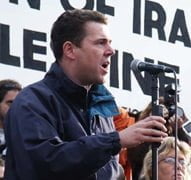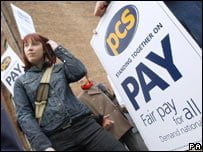For the past 4 years PCS members in the civil service have been in dispute over threats to their pensions, attacks on their sick leave, massive programmes of job cuts, privatisations and endemic low pay. Through united campaigning and strike action a number of concessions have been won. This is testament to members’ willingness to fight back.
 With a quarter of civil servants earning less than £16,000 a year and thousands on the minimum wage, the PCS National Executive Committee (NEC) stepped up its campaign on pay in 2008 and agreed a programme of action which included balloting members on a national strike. The demands of the pay campaign, involving nearly 300,000 civil servants were:
With a quarter of civil servants earning less than £16,000 a year and thousands on the minimum wage, the PCS National Executive Committee (NEC) stepped up its campaign on pay in 2008 and agreed a programme of action which included balloting members on a national strike. The demands of the pay campaign, involving nearly 300,000 civil servants were:
- Consolidated basic pay increases at least equal to the retail price index
- Remove pay progression costs from budgets for increases
- National pay bargaining – Fewer pay bargaining units
- Funding to remedy equal pay problems
- No link between pay and performance appraisal
- An end to pressure for regional rates of pay.
The massive support shown by members with the threat of a national strike on the 10th November forced the Government and the Treasury to agree to meaningful talks. A decision was made to suspend this action at the eleventh hour to allow a 28 day extension for talks to take place. The union acted in good faith and entered into further negotiations. This was a reasonable decision to take and Socialist Appeal supporters publicly defended the NEC’s decision to suspend the industrial action to allow talks to proceed. Union members do not take strike action lightly and would expect the union to explore the possibility that something could be achieved in negotiations. The Government would not have offered talks if the strike was not seen as being strongly supported by members from across the whole civil service.
Good Faith
Unfortunately, management have not acted in ‘good faith’ and have only given some pitiful concessions while PCS has given up a great deal. The outline of an agreement is set out in a letter sent to the union on 1st December from the Head of the Civil Service, Gus O’Donnell, who had previously urged members not to support the proposed national industrial action on pay. His letter sets out the key issues underlying a national pay agreement to which PCS has agreed. The letter states that the Cabinet Office are "prepared to consider some flexibility to recycle efficiency savings into pay. But this would be on an exceptional basis and would need to be decided case by case."
These ‘recyclables’ are a product of money savings that have been made from severe cuts in jobs. This has meant that staff in many cases are doing the work of two or even three people because of these losses. And we are told that management will only ‘consider in exceptional circumstances’ offering up some of this money into our pay! This means union members losing their jobs would be paying for any such pay increases. It is difficult to see how this could be defended by any trade union, let alone being advocated as a significant concession on the part of the Government, which is what the NEC and their cheerleaders are now doing. Indeed the Socialist Party, who have a significant presence on the NEC, have described the agreement as "material potential for improvements in pay".
Significant Workplace Reform
The letter also outlines a number of criteria that any changes would have to support, including "significant workforce reform" and "modernising pay systems to improve support for good performance." Reforms or improvement to pay of staff will need to be "funded from within existing budget settlements and be consistent with the Government public pay policy."
In effect Gus O’Donnell is saying there will be no more money and the divisive performance and bonus systems that PCS are vehemently opposed to will be retained. The letter states that "there is no 2% limit on public sector pay" which is being trumpeted by the NEC as a significant concession on the Government’s part but, as the letter also states, this is merely repeating what Ministers have already said. Other public sector unions have broken this 2% limit by taking an uncompromising attitude, so it is difficult to see what has been achieved here.
Imposed Settlement
Importantly, the letter also states that management will "seek to resolve existing pay disputes, without reopening any agreed or imposed existing pay settlements." In itself that hardly commits management to anything, but it does clearly exclude reopening any imposed pay settlements. The largest department in the civil service, the Department of Work and Pensions (DWP), is currently in the first year of a three year pay settlement. This was imposed by management after PCS rejected it as wholly inadequate. Where does the national pay agreement leave thousands of PCS members in the DWP?
Other members will be rightly asking of the agreement – is that it? Have we been in dispute for this time to get some very minor concessions and a huge ‘leap of faith’ that management will act in a genuine manner on further talks! For, while a national agreement on pay has been reached, other than the Gus O’Donnell letter there are no other details about this agreement and further talks are being held. The lack of detail is indicative of some confusion on the part of the NEC about exactly what has been agreed. This was reflected at the recent conference of Left Unity, the PCS Socialist caucus which has an overall majority on the NEC. The Socialist Party proposed a motion at the conference which endorsed the NEC’s decision and welcomed "the national agreement on pay" while maintaining that "PCS remains in dispute with the employer". How one can reach agreement with an employer while still being in dispute was not explained either in the motion or at the conference.
Left Unity Conference
At the Left Unity Conference, some NEC members expressed doubts whether union members would actually take strike action in the current economic climate. Here, we see the explanation for the decision taken by the NEC – a lack of confidence in PCS members. Members have voted in ballot after ballot for strike action but this is not good enough for the NEC. The motion welcoming the deal was narrowly passed by the conference, while a motion reiterating PCS policy on pay prior to the agreement was opposed by the Socialist Party and narrowly defeated. The Socialist Party was isolated on both votes, voting alone, but had the majority on both votes – clearly they had mobilised their membership for the conference. Other left groups at the conference, including Socialist Appeal supporters, voted against the pay agreement and against the Socialist Party line.
Activists should insist that the national pay agreement be put to the membership for agreement or rejection, rather than leaving the NEC to decide behind closed doors. The most democratic way to do this would be for PCS National Conference to be recalled, with meetings held in every workplace beforehand to mandate branch delegates, so members can decide for themselves what this agreement means. Socialist Appeal are confident that given a proper debate, members will reject this agreement.






